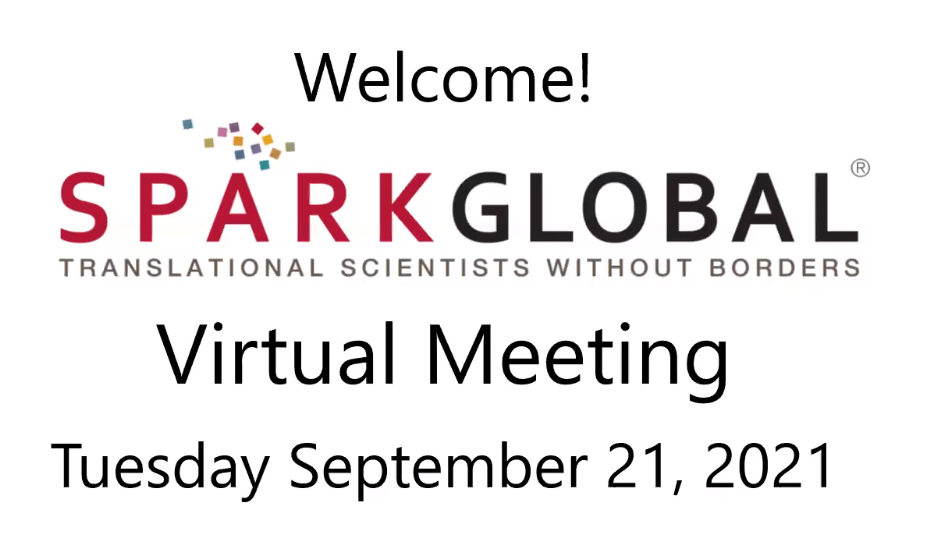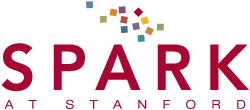Bridging The Gap

SPARK GLOBAL holds annual meeting
October 4, 2021
SPARK GLOBAL representatives from all over the world met during a virtual two-day conference at the end of September to discuss progress, provide updates on programs and projects, go over goals, and generally catch up with each other. It was wonderful to see everyone’s faces, even if virtual.
On Tuesday Sept 21, SPARK Asia, SPARK Oceania and SPARK America met to provide regional reports and updates. Wednesday, Sept 22, saw SPARK Africa, SPARK America and SPARK Europe meet and provide updates. SPARK at Stanford directors also gave updates. Each regional director provided a progress report, and many individual SPARK centers described their work of the last year.
Some highlights of the meeting follow.
On both days, SPARK Founder and Co-director Daria Mochly-Rosen emphasized SPARK GLOBAL’s vision and mission, quoting SPARK Europe Director Pasi Sorvisto who said, “SPARK turns good ideas into great solutions” through education, mentorship and modest funding.
As the last year has been mired in the COVID-19 pandemic, Dr. Mochly-Rosen also described SPARK’s COVID research efforts, and provided updates on awards SPARK has received and is under consideration for, and future education initiatives.
SPARK GLOBAL Executive Director Stephen Kargotich introduced the upcoming SPARK GLOBAL charter that will be implemented as a guiding document for the organization.
On Tuesday, SPARK Asia Regional Director Jane Tseng provided an update on that region. SPARK Taiwan, which began in 2013, has shown an impressive success rate of 39% out of 379 graduated projects. Dr. Tseng described some of the activities SPARK Taiwan held in 2020 and 2021, including cross-university and local meetings, seminars and training such as the SPARK Asia Showcase hosted by SPARK Taiwan. SPARK Asia Regional Director Tomoyoshi Koyanagi provided an update on SPARK Japan, and emphasized that despite the pandemic, multiple collaborations between and within SPARK Asia and Oceania were developed.
Next, SPARK Oceania Regional Director Laurence Meagher provided an update. Dr. Meagher noted that the pandemic has financially negatively impacted the region quite significantly, causing “an enormous economic impact.” SPARK Oceania Regional Director Michael Wallach and Dr. Meagher described specific successful projects, including an oral cancer project that again illustrates the collaboration between SPARK regions, in this case with SPARK Taiwan and SPARK at Stanford. “We have been strengthening our connections with other SPARK regions,” Dr. Meagher said. “We’ve found that we needed to come together as a virtual community,” including mutual education programs and sharing mentors across Australia.
SPARK Co-director Kevin Grimes then provided an update on SPARK Americas, including a list of current sites and potential new sites, and described ongoing collaborative activities such as shared workshops and seminars and SPARK Americas monthly meetings.
SPARK regional directors also expressed their interest in digital health technologies and developing those technologies, and suggested connections with SPARK groups with various expertise in digital health to support each other.
On Wednesday, SPARK Africa Regional Director Collen Masimirembwa described updates from that region, including local educational initiatives to train the biomedical workforce in Africa. A Masters program in genomics and precision medicine was successfully started in January 2021, a two-year program with training and hands-on research work that has accepted nine students from all over Africa.
SPARK Europe kicked off the progress report with updates for the region, including joint showcase events, webinar series and educational activities, and new programs about to start. Local programs then provided updates for their institutional SPARK programs, including Germany, Finland, Norway, Israel, Italy, Poland, Czech Republic, and Denmark. From SPARK Finland, 18-20 startups have been established from 35 projects that have completed the program, an impressive success rate. SPARK Norway has also shown success with 4 new startups and 1 clinical trial, and the SPARK program was a key factor that led to the establishment of a new innovation unit at the University of Oslo. A new startup, Novavido, recently launched from the SPARK at Italian Institute of Technology program. Similar to other regions, SPARK institutes in Europe have joint mentoring events to share local mentors.
SPARK Associate Director Peter Santa Maria introduced the SPARK Americas segment, followed by SPARK Americas Chair and Calgary coordinator Nicola Quiggin, who expanded on the activities underway in the region. SPARK Calgary has hosted two well-received seminars for the academic innovation community, and plans to take the lead on organizing a SPARK team networking event. Individual programs from Calgary, Colorado, Wyoming, Mexico, Vermont then provided updates. Colorado’s SPARK program is quite mature, supported by NIH’s REACH program, and has had an impressive 15 startups created out of 36 projects. One startup company, SummitDx, is administering over 10% of COVID diagnostic testing in the state of Colorado.
Many regions noted that progress has been impeded by the COVID-19 pandemic, particularly lack of funding, and challenges in meeting with other institutions and groups. However, a common theme this year has been creating and sustaining collaborative opportunities locally and regionally, despite not being able to meet in person. During the meeting itself, SPARK regions offered their support to other institutions to assist with various projects.
We hope that SPARK GLOBAL will be able to meet in person next year!
